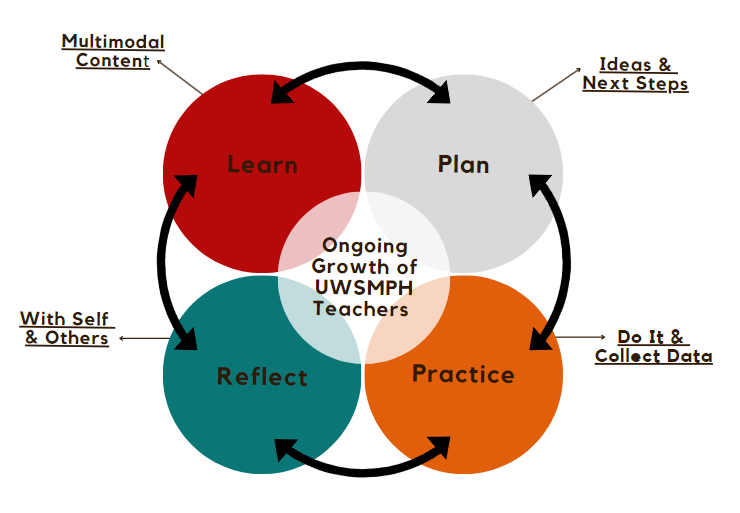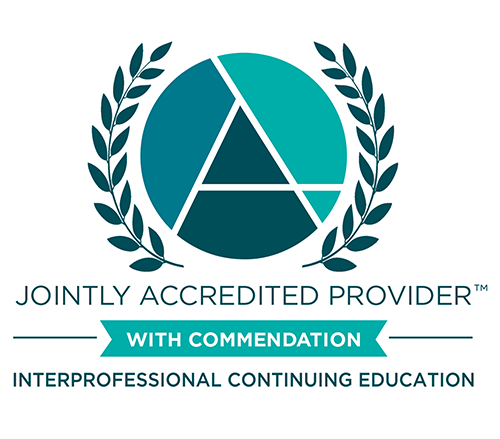Education Essentials - Growing Teaching Expertise
Welcome In this module Growing Teaching Expertise!
In this module we will explore the development of expertise, growth mindset, professional identity formation, and teaching philosophy. We will discuss the challenges and approaches to trying out new teaching strategies and skills, as well as the recognition that there is no perfect teaching and like all learners–we will have missteps here and there. We will outline the Reflect, Learn, Plan, and Practice cycle for ongoing SMPH teacher development.
Intended Audience
The Essentials in Education Module Series is intended for interprofessional health science faculty and staff who are interested in growing their skills and knowledge in the domains of teaching and learning.
Learning Objectives
Education Essentials: Growing Teaching Expertise
As a result of participation in this educational activity participants will:
- Outline steps to grow teaching expertise in medical education with the Reflect, Learn, Plan, Do cycle based on Ericsson's Development of Expertise Theory and Kolb’s Experiential Learning Cycle.
- Describe the concepts of professional identity formation, teaching philosophy, and growth mindset.
- Reflect on your teaching professional identity, philosophy, mindset, successes, and challenges.
- Identify 1-2 areas of strength and 1-2 areas for growth within your teaching practice
- Create your individual teacher development plan to build a teaching skill with the Reflect, Learn, Plan, Practice framework, including possible learning resources, plan for practice, and immediate next steps.
This module is part of UWSMPH Office of Faculty Affairs and Development’s Education Essentials online modular curriculum: a collection of modules aimed at developing foundational skills important for all teachers—across professions, specialties, and settings in health science education. The goal is to support all health science teachers to Reflect, Learn, Plan, and Practice to deepen expertise in an ongoing cycle and grow our UWSMPH educator community.

Elements of Competence
This continuing education (CE) activity is designed to improve learner competence in the following areas:
- ACGME/ABMS Competencies - Practice-based learning and improvement, Interpersonal and Communication Skills, Professionalism, System-based practice
- National Academy of Medicine Competencies - Apply quality improvement
- Interprofessional Education Collaborative Competencies - Roles/responsibilities, Interprofessional communication, Teams and teamwork
- Diversity, Equity, and Inclusion: Engage in Self-refection, Address Health Disparities, Value Diversity in the Clinical Encounter
| DEFINITIONS | |||
| Anne Stahr, MS, PhD Director of Faculty Development Programming Office for Faculty Affairs and Development University of Wisconsin-Madison School of Medicine and Public Health | Sara Johnson, MD Associate Professor University of Wisconsin-Madison School of Medicine and Public Health | Amanda K DeVoss, MMS, PA-C Academic Director / Clinical Assistant Professor University of Wisconsin-Madison School of Medicine and Public Health |
Aeron Adams, DNP, PMHNP-BC | Marco Miceli Continuing Education Programs Intern Office of Continuing Professional Development University of Wisconsin-Madison School of Medicine and Public Health | Julie Martinelli Educational Technology Manager Office of Continuing Professional Development University of Wisconsin-Madison School of Medicine and Public Health Interprofessional Continuing Education Partnership |
Faculty Disclosure
It is the policy of the University of Wisconsin–Madison Interprofessional Continuing Education Partnership (ICEP) to identify, mitigate and disclose all relevant financial relationships with ineligible companies* held by the speakers/presenters, authors, planners, and other persons who may influence the content of this accredited continuing education (CE). In addition, speakers, presenters and authors must disclose any planned discussion of unlabeled/unapproved uses of drugs or devices during their presentation.
* Ineligible companies are those whose primary business is producing, marketing, selling, re-selling, or distributing healthcare products used by or on, patients.
The ACCME does not consider providers of clinical services directly to patients to be ineligible companies.
For this accredited continuing educational activity all relevant financial relationships have been mitigated and detailed disclosures are listed below:
Planning Committee
Name | Role | Financial Relationship Disclosures | Discussion of Unlabeled/Unapproved uses of drugs/devices in presentation? |
Aeron Adams | Committee Member, Reviewer | No relevant relationships with ineligible companies to disclose | No |
Amanda DeVos | Committee Member, Reviewer | No relevant relationships with ineligible companies to disclose | No |
Sara Johnson | Committee Member, Planner, Speaker/Author | No relevant relationships with ineligible companies to disclose | No |
Anne Stahr | Committee Member, Planner, Speaker/Author | No relevant relationships with ineligible companies to disclose | No |
Nancy Raymond | Peer Reviewer | No relevant relationships with ineligible companies to disclose | No |
Grace Leonard | Planner | No relevant relationships with ineligible companies to disclose | No |
Julie Martinelli | Planner | No relevant relationships with ineligible companies to disclose | No |
Marco Miceli | Planner | No relevant relationships with ineligible companies to disclose | No |
Accreditation Statement
 | In support of improving patient care, the University of Wisconsin–Madison ICEP is jointly accredited by the Accreditation Council for Continuing Medical Education (ACCME), the Accreditation Council for Pharmacy Education (ACPE), and the American Nurses Credentialing Center (ANCC) to provide continuing education for the healthcare team. |
Credit Designation Statements
American Medical Association (AMA)
The University of Wisconsin–Madison ICEP designates this enduring material for a maximum of 1 AMA PRA Category 1 Credits™. Physicians should claim only the credit commensurate with the extent of their participation in the activity.
American Nurses Credentialing Center (ANCC)
The University of Wisconsin–Madison ICEP designates this enduring material for a maximum of 1 ANCC contact hours.
American Academy of Physician Assistants (AAPA)
| The University of Wisconsin–Madison ICEP has been authorized by the American Academy of PAs (AAPA) to award AAPA Category 1 CME credit for activities planned in accordance with AAPA CME Criteria. This activity is designated for 1 AAPA Category 1 CME credits. Approval is valid until 2/27/2028. PAs should only claim credit commensurate with the extent of their participation. |
Continuing Education Units (CEUs)
The University of Wisconsin–Madison ICEP, as a member of the University Professional & Continuing Education Association (UPCEA), authorizes this program for 0.1 CEUs or 1 hour.
Available Credit
- 1.00 AAPA Category 1 CME
- 1.00 AMA PRA Category 1 Credit™
- 1.00 ANCC Contact Hours
- 1.00 University of Wisconsin–Madison Continuing Education Hours
- 1.00 Approved for AMA PRA Category 1 Credit™
Registration for this activity can only be completed through the ICEP Learning Portal. Attendee registrations made through any other sites cannot be honored. UW-Madison ICEP is not able to refund fees paid through unaffiliated registration sites, such as eMedEvents.com, MedConfWorld.com, EventEgg.com, and 10times.com. Please report any unauthorized websites or solicitations for registrations to [email protected]
Accessibility
If you need anything to participate in this program, please contact [email protected].
Questions?
Required Hardware/software
Computer, tablet, or other mobile device with sound.
Free, current version of Edge, Firefox, Safari, or Chrome. Some older browsers and Internet Explorer could produce error messages or not display the content correctly.
Free, current version of Adobe Acrobat Reader or other .pdf reader.

 Facebook
Facebook X
X LinkedIn
LinkedIn Forward
Forward


